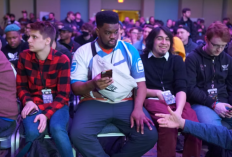Online Game Addiction Psychology: What Gamers Won’t Admit

Gaming Area On the second floor, in addition to the Elite Suite, there are two more medium-sized gaming areas for up to 10 people. There are also two rooms for 2-3 people each for smaller teams. All gaming stations are equipped with high-quality hardware -ELLA DON-https://unsplash.com/
Online Game Addiction Psychology: What Gamers Won’t Admit
Somewhere between midnight and sunrise, millions of players around the world are still staring at glowing screens — chasing one more victory, one more upgrade, one more moment of control. They tell themselves they can stop anytime, but deep down, they know it’s not that simple. What they won’t admit is that online games are no longer just entertainment; they’re a psychological maze designed to keep them inside.
The Invisible Trap: Why “Just One More Game” Never Ends
The phrase “just one more game” is as old as gaming itself, but its power has grown with online connectivity. Every match, every notification, every reward lights up the brain’s pleasure centers with a burst of dopamine — the chemical that signals “something good just happened.” But like all highs, it fades fast, pushing players to chase it again.
Games are built around intermittent rewards — unpredictable prizes that appear just often enough to keep players hooked. It’s the same psychology that fuels gambling. When you never know exactly when the next win will come, your brain can’t resist trying again.
The Safe Escape: Emotion, Stress, and Control
Behind the screen, real life waits — stressful jobs, broken routines, and emotional fatigue. Online games offer a perfect escape. In these virtual spaces, success feels attainable, progress is visible, and failure carries no real consequence. It’s a controlled world in contrast to the messy unpredictability of everyday life.
Psychologists call this escapism through agency — the feeling that, inside the game, you have full control over outcomes. You can win battles, build empires, or rewrite your identity. For players struggling with control in real life, that sense of mastery becomes an emotional lifeline.
Social Validation and the Digital Tribe
Online gaming isn’t a solitary activity anymore — it’s a social ecosystem. Guilds, clans, and multiplayer teams provide belonging and recognition. When someone earns praise in a group chat or leads their team to victory, it activates the same neurological reward systems as real-world approval.
This digital validation can be powerful. A player who feels unseen in their offline life suddenly becomes a leader, a strategist, or a hero online. Over time, that recognition becomes addictive, creating a feedback loop of performance and approval. The more validation they receive, the harder it becomes to log off.
The Silent Role of Design Psychology
Developers rarely admit it, but modern games are built with psychological precision. The interface design, sound effects, and timing of notifications all serve one purpose: to keep the player emotionally engaged. The longer they stay, the more valuable they become — not just as users, but as data points and potential spenders.
- Daily Rewards: Encourage players to log in consistently, turning gaming into a habit.
- Progress Tracking: Visual bars and milestones reinforce the feeling of growth.
- Scarcity Tactics: Limited-time events and rare skins generate urgency and fear of missing out.
- Push Notifications: Trigger curiosity and re-engagement, even outside the game.
- Microtransactions: Offer instant gratification for a price — a shortcut to emotional reward.
The Dopamine Debt
Each win, achievement, or loot box triggers a dopamine release. But over time, the brain adjusts — requiring bigger and more frequent hits to feel the same excitement. This is known as the dopamine tolerance loop. It’s why casual gaming can slowly evolve into obsession, even among people who once claimed they weren’t “that kind of gamer.”
Players begin to play not for joy, but to avoid the discomfort of stopping. What started as entertainment becomes emotional maintenance — the digital equivalent of needing coffee to stay awake.
Denial, Rationalization, and the Hidden Cost
Gamers rarely recognize the pattern as addiction. They tell themselves it’s harmless, that they’re just having fun, that everyone else plays too. But slowly, other parts of life begin to shrink: social circles, sleep, work performance. The hours spent in-game replace real experiences, and identity becomes tied to digital progress.
Ironically, the more players feel guilty about the time spent gaming, the more they turn to games for comfort — reinforcing the same emotional loop they wish to escape. The guilt feeds the need, and the need feeds the cycle.
Behind the Avatar: A Modern Psychological Mirror
Online games are mirrors reflecting our deepest human needs — control, connection, purpose. They offer what many modern lives lack: clarity of goals, instant feedback, and visible progress. The problem isn’t the games themselves, but how perfectly they satisfy our psychology in a world that often doesn’t.
In 2025, as virtual economies expand and digital avatars blur with real identities, understanding this psychological dynamic becomes essential. Game addiction isn’t simply about lack of discipline; it’s about how technology has learned to speak directly to the human mind, promising meaning, mastery, and belonging — all behind the glow of a screen.







